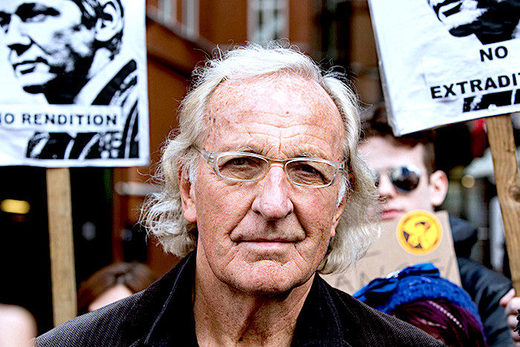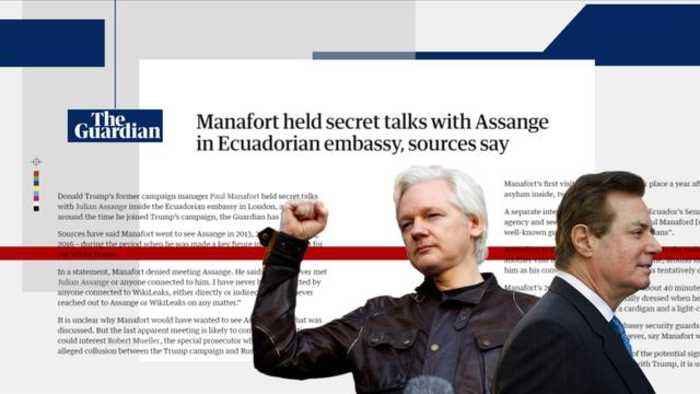
WikiLeaks publisher Julian Assange has vehemently denied that he ever met Donald Trump’s former campaign manager, according to journalist and filmmaker John Pilger, who met with Assange at Ecuador’s embassy in London last week.
Pilger said Assange told him the story published by The Guardian on Nov. 27 was a “total fabrication.”
Pilger told Consortium News in an interview for the Unity4J vigil on Friday that “I personally can confirm that did not happen. He said it was a fabrication. It was not possible. The way internal security works at that embassy, it was not possible.”
Pilger called The Guardian story “an indication of a kind of degradation of the media today and especially of the ‘respectable’ media. We discussed that a great deal.”
Pilger said Assange had been the target of attacks “over the years” that have come “thick and fast.” He said: “And for one man to cope with them is an extraordinary feat. Only occasionally does he express anger—he does it as anyone of us would feel—say on an attack like The Guardian‘s utterly false story.”
First Visit Since March
Pilger had not visited Assange since before March, when the Ecuadorian government imposed a ban on his internet and phone connection, and limited visitors to his lawyers and family members.
Pilger’s impression on seeing him again is that Assange has lost no sharpness of mind after more than six years confined to a small space in the embassy, and now nine months cut off from the outside world.
“He’s in very good spirits,” Pilger said. “The extraordinary resilience of this man is something to behold. In his own personality, intellectually he is Julian.”
“I can’t say what he’s feeling. His health is probably holding steady but he urgently needs comprehensive diagnostic work done,” said Pilger.
“But people should know that Julian’s spirits, his whole sense of ‘to hell with them,’ and his own resolve to stand up to those who would want to do a great injustice to him is undiminished,” he said. “He’s not leaving, they will have to throw him out. He’s not going anywhere.”
The United States government has admitted that it has indicted Assange for publishing classified documents that revealed apparent U.S. war crimes and corruption. Assange fears that if he leaves the embassy British authorities would arrest him on bail skipping charges and then extradite him to the U.S. for prosecution.


Touchstone of Opposition
Pilger said The Guardian story was the best example he could think of that expresses today’s Cold War. “I’ve never known it to be as explicit as it is now. And that fabricated Guardian story … is an example of that.”
He said: “In the first Cold War there was an opposition in those days. There isn’t a popular opposition now. The so-called liberal opposition is so confused, so disorientated, and so, almost wretched, in its uncertainty of its true allegiances, in its collusion, that there isn’t a major anti-war movement.”
“In many ways, Julian is a touchstone for opposition to so much of what is happening in our world. Of all the cases that illustrate resistance to that, there is none like that of Julian Assange.
“And he needs public, popular support. He needs people to go into the street outside the embassy. To go in the streets all over the world, as they have done in the past,” Pilger said.
Watch the entire, original video:
This article was originally published by “ Consortium News“
Joe Lauria Interviews John Pilger on Julian Assange
The 21st Century
